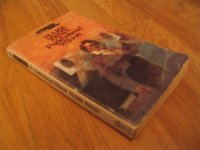It's been a while!
Finally finished
Tolkien and The Great War. Basically, the author says that WWI was a heavy influence on Tolkien's works, which doesn't really come as a surprise to anyone, but it's nice to have it all spelled out. Also there was a lot of info about WWI which i hadn't known. - which doesn't really come as a surprise to anyone, but it's nice to have it spelled out.
Interestingly, the author considered Tolkien's early work such as primarily
The Book of Lost Tales and
The Cottage of Lost Play to be superior to the later
Silmarillion, which basically tells pretty much the same stories but with an additional few decades of simmering. His point is mainly that the earlier versions had a whimsy, vivacity, and sense of wonder which gave way before the overpowering monolith of the Great History in the Silmarillion. I think the most easily recognized example is the loss of the comical
Tevildo the Cat scene from the lay of
Beren and Luthien.Finished
Woman Warrior, and i think i read every page. Excellent writing, and as
Jenn See suggested, i will be on the lookout for
Kingston's Tripmaster Monkey.
Twain- I'm not sure what it is with me and Twain lately. I finished
Puddinhead Wilson, am currently reading
Tom Sawyer and
Life on the Mississippi, and plan on reading
Conneticut Yankee the next time i come across it.
After reading
Puddinhead, i feel i have to take back some of the criticisms i made earlier about Twain's antirascist status. While i still feel that humor is primary to Twain, he does lead the story into realms of notable black/white race relations.
He still hates the red man, tho.
Am also re-reading
Ray Bradbury's The Martian Chronicles, which i read long ago in junior high, i believe. Bradbury is really not normal science-fiction. He's much, much less interested in science than most authors of his era (
Asimov, eg). For example, in The Martian Chronicles, the crews of the first three rocket ships to land on Mars are destroyed in the following way:
- A native martian couple has been having domestic friction, mostly because the wife has been having dreams about having an affair in a few days with an alien who will land from the stars. The husband is jealous, and when the day comes, he makes the wife stay at home to entertain "The Joneses", and goes out to where the rocket has landed, and shoots the two crewmembers and comes home.
- A year later, the second rocket ship lands, and the crew make their way to a martian town, but everyone they introduce themselves to can't be bothered with the first Earthmen and pass them off one by one until they arrive at an insane asylum full of first Earthmen. The head doctor finally plays along with our heros and lets them bring him to their rocket ship. Now on Mars, insane people can project their insanity telepathically, so to cure the patients and himself, the doctor shoots all of them.
- A while later, the third rocket to mars lands and discovers that their childhood hometown is there, along with their dead loved ones, back to life. All the crewmembers go to their individual homes with joy, and in the middle of the night are killed, because it was a trick.
.. and so on. Bradbury's Mars isn't just strange from a scientific point of view (in fact it's entirely familiar scientificall), it's strange from a metaphysical point of view.
It's a bit frustrating, honestly, as a guy who likes his hard sci-fi.
I've currently lost it, but i expect i'll finish it anyhow.




